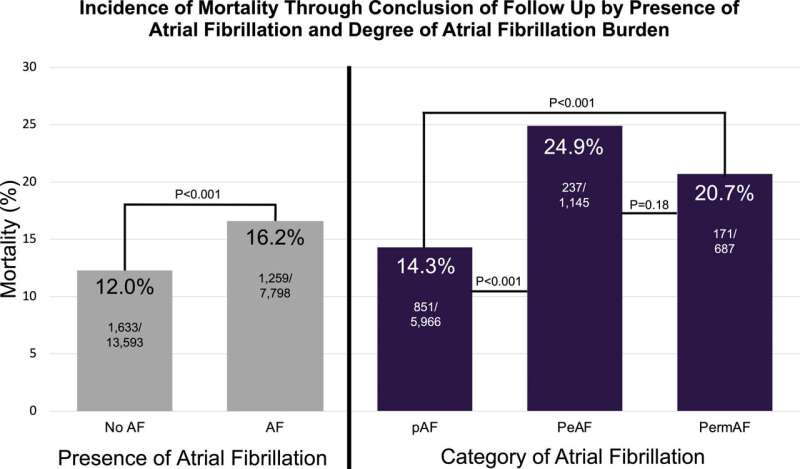This article has been reviewed according to Science X's editorial process and policies. Editors have highlighted the following attributes while ensuring the content's credibility:
fact-checked
peer-reviewed publication
trusted source
proofread
'Hidden' irregular heartbeats may raise risk of death

Irregular heartbeats can raise a person's risk of death even when they go unnoticed by traditional heart monitoring, according to a Northwestern Medicine study published in Circulation.
Atrial fibrillation—rapid, irregular beating of the heart—is the most common type of irregular heart rhythm, affecting more than 2 million people in the U.S., according to the Centers for Disease Control and Prevention.
While atrial fibrillation can have deadly consequences, most don't even know they have the condition, said Rod Passman, MD, the Jules J. Reingold Professor of Electrophysiology and senior author of the study.
"Almost everything we know about atrial fibrillation is gleaned from clinical atrial fibrillation, meaning that you walked into your doctor's office with so much atrial fibrillation that your doctor was able to pick it up on a physical exam or an electrocardiogram," said Passman, who also directs the Center for Arrhythmia Research.
"Our study, however, looked at what's called subclinical atrial fibrillation. Patients who have implantable pacemakers and defibrillators may have episodes of AFib picked up by their device that they're completely unaware of. The question we wanted to ask is, is 'Does subclinical atrial fibrillation have equal impact on mortality as clinical atrial fibrillation?'"
In the study, Passman and his collaborators analyzed data from more than 20,000 people with pacemakers or defibrillators. Investigators then compared episodes of atrial fibrillation with instances of death after two years and found that people with abnormal heart rhythms were at a higher risk for death, even if the episodes of atrial fibrillation were only able to be detected by an implanted device and last a few hours.
Study subjects with atrial fibrillation had a 29% increased risk of mortality compared to those without, according to the study. Those with persistent atrial fibrillation—meaning that the irregular heartbeats did not return to normal on their own within a week—had a 39% higher risk of death.
The findings highlight how often undetected episodes of irregular heartbeats can still have potentially deadly implications, Passman said.
"Of those 22,000 individuals in this study, about 30% had at least one episode of atrial fibrillation detected on their device," Passman said.
"These episodes could last minutes to hours, even days sometimes. When we followed these patients for about two years, about 13% of them died. Those that had atrial fibrillation had a significantly increased risk of mortality compared to those patients without atrial fibrillation, and the more atrial fibrillation they had—if they went into it for days on end—the higher the risk of dying than those patients who had brief episodes of atrial fibrillation."
More work is needed to assess the impacts of subclinical atrial fibrillation, Passman said, and future studies will attempt to mitigate episodes of irregular heartbeats to assess the impact on overall mortality.
"Some of the questions we need to ask ourselves are, 'What's the impact of those silent episodes of AFib that we may have never picked up with the kind of medical tests that we do?" Passman said. "What's the impact on patient's risk of stroke or risk of heart failure and risk of death? And can we intervene early on and prevent those downstream events from occurring?"
More information: Graham Peigh et al, Association of Atrial Fibrillation Burden and Mortality Among Patients With Cardiac Implantable Electronic Devices, Circulation (2024). DOI: 10.1161/CIRCULATIONAHA.124.069757





















